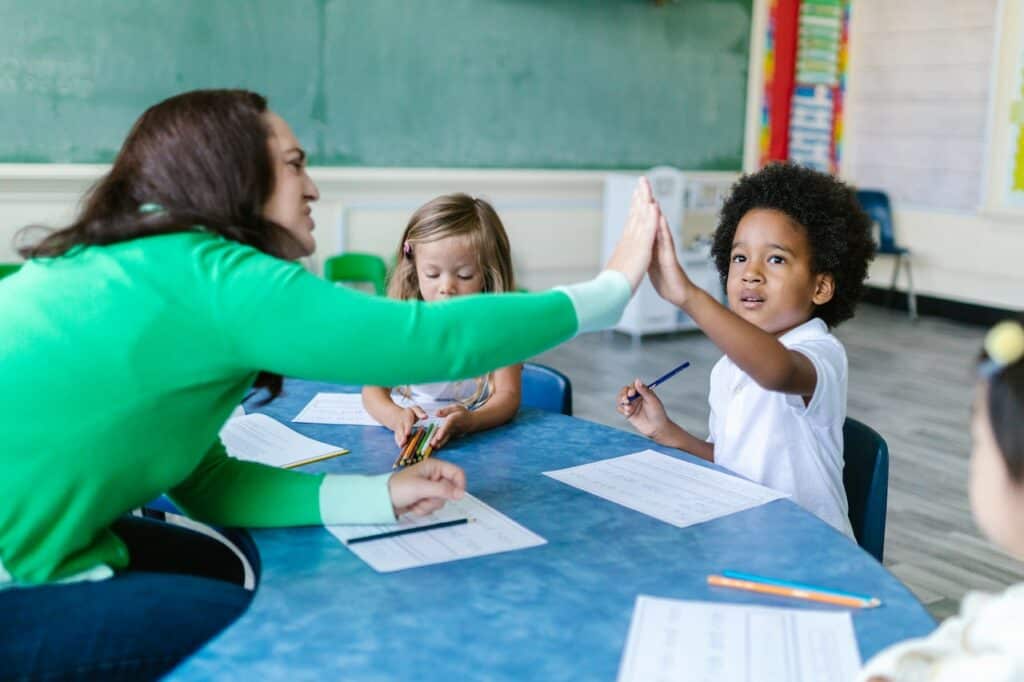Accidents happen, and they are a normal part of growing up. However, when a child who has been potty trained for years suddenly starts having accidents at school, it can be concerning for both parents and teachers. It is not uncommon for five-year-olds to experience accidents at school, but it is important to understand why it is happening and how to manage it.
Understanding Accidents at School There are several reasons why a five-year-old may start having accidents at school. It could be due to physical causes such as constipation, urinary tract infections, or gastrointestinal issues. Psychological triggers such as stress, anxiety, or changes in routine can also play a role. In some cases, the child may be experiencing a regression in their potty training, which is normal but requires attention from parents and teachers.
Key Takeaways
- Accidents at school are not uncommon for five-year-olds, but it is important to understand why they are happening.
- Physical causes such as constipation or urinary tract infections, as well as psychological triggers such as stress or anxiety, can contribute to accidents.
- Parents and teachers can work together to manage accidents by addressing the root cause and providing support to the child.
Understanding Accidents at School
Accidents at school are a common occurrence, especially among young children. It is not uncommon for a 5-year-old child attending preschool or kindergarten to have accidents at school. These accidents can be embarrassing for the child and frustrating for the parents and teachers.

There are several reasons why a child may have accidents at school. One of the most common reasons is that the child is still learning how to control their bladder and bowel movements. This is a natural part of the development process, and it can take some time for a child to fully master this skill.
Another reason why a child may have accidents at school is that they may be too busy playing or engaged in other activities to take a bathroom break. In some cases, a child may also be afraid to ask for a bathroom break because they do not want to miss out on any activities.
It is important for parents and teachers to be patient and understanding when a child has accidents at school. Punishing or shaming the child is not an effective solution and can actually make the problem worse. Instead, parents and teachers should work together to help the child learn how to control their bladder and bowel movements and encourage them to take bathroom breaks when needed.
In some cases, accidents at school may be a sign of an underlying medical condition, such as a urinary tract infection or constipation. If a child is having frequent accidents at school, it may be a good idea to consult with a pediatrician to rule out any medical issues.
Overall, accidents at school are a normal part of childhood development, and parents and teachers should take a supportive and understanding approach to help children overcome this challenge.
Physical Causes of Accidents
Accidents in young children can be caused by physical factors that are beyond their control. Understanding these physical causes can help parents and teachers identify the underlying issue and take appropriate steps to address it.
Constipation and Accidents
Constipation is a common cause of accidents in young children. When a child is constipated, the hard stool can put pressure on the bladder and cause accidents. Children who are constipated may also have stomach pain, bloating, and difficulty passing stool.
Parents and teachers can help prevent constipation by ensuring that the child is eating a healthy diet that includes plenty of fiber and fluids. If constipation persists, a doctor may recommend a laxative or stool softener.
Urinary Tract Infections
Urinary tract infections (UTIs) can cause accidents in young children. UTIs are caused by bacteria that enter the urinary tract and can lead to pain, fever, and accidents. Girls are more likely to develop UTIs than boys.
Parents and teachers should be aware of the signs of a UTI, such as frequent urination, pain or burning during urination, and foul-smelling urine. If a UTI is suspected, the child should be taken to a doctor for treatment with antibiotics.
Voiding Dysfunction
Voiding dysfunction is a condition in which the bladder muscles do not work properly, leading to accidents. Children with voiding dysfunction may have trouble emptying their bladder completely or may have accidents during the day or night.
Treatment for voiding dysfunction may include bladder training exercises, medication, or surgery. Parents and teachers should work with a doctor to develop a treatment plan that is tailored to the child’s needs.
Overactive Bladder
Overactive bladder is a condition in which the bladder muscles contract too often, leading to frequent urination and accidents. Children with overactive bladder may also have a strong urge to urinate and may have accidents during the day or night.
Treatment for overactive bladder may include medication, bladder training exercises, or surgery. Parents and teachers should work with a doctor to develop a treatment plan that is appropriate for the child’s age and condition.
Medical Conditions
Some medical conditions can also cause accidents in young children. Diabetes, spina bifida, cerebral palsy, and Williams syndrome are just a few examples of conditions that can affect bladder control.
Parents and teachers should be aware of any underlying medical conditions that may be contributing to the child’s accidents. Treatment for these conditions may include medication, surgery, or other interventions.
Psychological Triggers
When a child experiences accidents at school, it is important to consider any psychological triggers that may be contributing to the problem. Here are some common psychological triggers that may be causing a 5-year-old to have accidents at school.

Stress and Anxiety
Stress and anxiety can manifest in many ways, including physical symptoms like stomachaches and headaches, and even accidents. If a child is feeling stressed or anxious, they may have a harder time controlling their bladder or bowels. Stressful events like moving, the arrival of a new baby, or a traumatic experience can all trigger anxiety in a child.
Changes and Transitions
Big changes and transitions can be difficult for young children to handle. If a child has recently moved to a new home, started a new school, or experienced a change in their family structure, they may be feeling overwhelmed and struggling to adjust. This can lead to accidents at school.
Fear and Embarrassment
Fear and embarrassment can also contribute to accidents at school. If a child is afraid of using the bathroom at school, or feels embarrassed about their accidents, they may try to hold it in for too long, which can lead to accidents. Bullying or teasing from other students can also cause a child to feel embarrassed or anxious, which can contribute to accidents.
By identifying and addressing any psychological triggers that may be contributing to a child’s accidents at school, parents and teachers can work together to help the child feel more comfortable and confident at school.
Potty Training and Regression
Understanding Regression
Potty training regression is a common issue among young children, particularly those who have been potty trained for a while. Regression is when a child who has been successfully using the toilet starts having accidents again. This can be frustrating for parents and caregivers, and it can be embarrassing for the child.
There are many reasons why a child may experience regression. One common cause is stress or anxiety. For example, if a child is starting a new school or daycare, they may feel overwhelmed and anxious, which can lead to accidents. Other causes of regression can include illness, changes in routine, or a new sibling.
It’s important for parents and caregivers to be patient and understanding when a child is experiencing regression. Punishing or shaming the child can make the problem worse. Instead, it’s important to offer support and encouragement.
Potty Training Challenges
Potty training can be a challenging process for both parents and children. Some children may take longer to potty train than others, and some may have more accidents than others. It’s important to remember that every child is different, and there is no one “right” way to potty train.
One common challenge of potty training is getting the child to use the toilet consistently. Some children may be resistant to using the toilet, or they may have trouble recognizing when they need to go. In these cases, it can be helpful to set a regular schedule for bathroom breaks. For example, the child may be encouraged to use the toilet every hour or two.
Another challenge of potty training is finding the right training pants. Some children may prefer pull-up style training pants, while others may do better with underwear. It’s important to find a style of training pants that the child is comfortable with.
Overall, potty training and regression are common issues that many parents and caregivers face. With patience, understanding, and support, most children are able to successfully navigate the potty training process.
Role of Parents and Teachers

Parental Support
Parents play a crucial role in helping their child overcome accidents at school. They should provide emotional support to their child and work with the teacher to find a solution. Parents can take the following steps to support their child:
- Encourage the child to communicate their needs and feelings with the teacher.
- Establish a routine for bathroom breaks and ensure the child is following it.
- Check if there are any underlying medical issues causing the accidents.
- Provide positive reinforcement and praise for dry days.
Parents should also be willing to attend meetings with the teacher and principal to discuss the child’s progress and find a solution.
Teacher’s Response
Teachers should be understanding and supportive when dealing with a child who is having accidents at school. They should take the following steps to help the child:
- Provide a safe and supportive environment for the child.
- Establish a routine for bathroom breaks and ensure the child is following it.
- Encourage the child to communicate their needs and feelings.
- Provide positive reinforcement and praise for dry days.
- Work with the parents to find a solution and attend meetings with the parents and principal if necessary.
Teachers should also be aware of any underlying medical issues and communicate with the parents if they suspect any problems.
Managing Accidents at School

Creating a Routine
Creating a routine for your child can be helpful in preventing accidents at school. It’s important to establish a regular schedule for meals and bathroom breaks. This can help your child become more aware of their body’s needs and learn to anticipate when they need to use the restroom.
It may also be helpful to create a visual schedule or checklist that your child can follow. This can include reminders to use the bathroom before leaving for school, during breaks, and after lunch.
Encouragement and Positive Reinforcement
Positive reinforcement can be a powerful tool in managing accidents at school. Praising your child for using the restroom at appropriate times can help build their confidence and motivate them to continue good habits.
It’s important to avoid shaming or punishing your child for accidents. Instead, focus on providing positive feedback and encouragement.
Handling Cleanup and Responsibility
Accidents can happen despite the best efforts to prevent them. It’s important to discuss with your child what to do if they have an accident at school.
This can include providing them with a change of clothes and supplies such as wipes or diapers if necessary. It’s also important to teach your child to take responsibility for their accidents by helping with cleanup and notifying a teacher or staff member.
Overall, managing accidents at school requires a combination of routine, encouragement, and responsibility. By working with your child and their school, you can help prevent accidents and build good habits for the future.
Related Post: How Will I Know If My Child Has Trouble Hearing
Frequently Asked Questions
Is it normal for a 5-year-old to have an accident at school?
Yes, it is normal for 5-year-olds to have accidents at school. Many children at this age are still mastering bladder and bowel control. However, if accidents persist or become more frequent, it may be a sign of an underlying issue that needs to be addressed.
Why does my 5-year-old keep peeing his pants at school?
There can be several reasons why a 5-year-old keeps peeing his pants at school. It could be due to anxiety, stress, or fear of using unfamiliar bathrooms. It could also be due to a medical condition such as a urinary tract infection or constipation. It is important to speak with your child’s pediatrician to rule out any medical issues and to work with the school to address any environmental or emotional factors that may be contributing to the accidents.
How do I stop my child from having accidents at school?
There are several strategies you can try to help stop your child from having accidents at school. Encouraging your child to use the bathroom regularly, providing a change of clothes, and working with the school to establish a bathroom routine can all be helpful. Additionally, addressing any underlying anxiety or stress through therapy or relaxation techniques may also be beneficial.
Embarrassing potty accidents at school
Potty accidents at school can be embarrassing for children. It is important to approach the situation with sensitivity and understanding. Providing a change of clothes and reassuring your child that accidents happen can help alleviate any embarrassment. Working with the school to establish a plan for handling accidents can also be helpful.
6 year-old suddenly having accidents at night
If a 6-year-old suddenly starts having accidents at night, it could be a sign of an underlying medical condition such as a urinary tract infection or sleep apnea. It is important to speak with your child’s pediatrician to rule out any medical issues and to establish a plan for addressing the accidents.
6 year-old wetting pants during the day
If a 6-year-old is wetting their pants during the day, it could be due to a medical condition such as constipation or a urinary tract infection. It could also be due to emotional factors such as stress or anxiety. It is important to speak with your child’s pediatrician to rule out any medical issues and to work with the school to address any environmental or emotional factors that may be contributing to the accidents.

Iesha is a loving mother of 2 beautiful children. She’s an active parent who enjoys indoor and outdoor adventures with her family. Her mission is to share practical and realistic parenting advice to help the parenting community becoming stronger.
